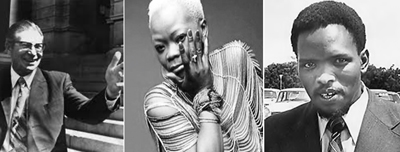Latest News Archive
Please select Category, Year, and then Month to display items
17 September 2018
Photo Charl Devenish
 Innocensia Mangoato’s research on using cannabis to reverse anticancer drug resistance has been awarded in the prestigious Women in Science Awards.
Innocensia Mangoato’s research on using cannabis to reverse anticancer drug resistance has been awarded in the prestigious Women in Science Awards.
“There’s this misconception among young people that science is difficult and that it’s somehow a man’s domain,” says Innocensia Mangoato, Masters student in Pharmacology, who has just been awarded in the prestigious Women in Science Awards by the Department of Science and Technology.
Cannabis research
Innocensia won in the Master’s Degree category for her research on the use of cannabis in reversing anticancer drug resistance. Her department had to apply for a special permit to grow cannabis for research and medicinal purposes.
“Her findings have already indicated a promising reversal of resistance to drugs in a variety of cancers. We plan to explore these results further in a possible PhD,” says her study leader, Prof Motlalepula Matsabisa.
Innocensia says she’s always had an interest in science, and initially wanted to study medicine. She ended up doing a BSc in Physiology and Genetics.
She hopes that her research will help government to develop a policy around the use of cannabis for medicinal purposes which could ultimately lead to developing cancer treatment with fewer side-effects.
Female mentors
“My mentor during my Honours studies was Dr Makhotso Lekhoa. Her passion for her field and her patience in conveying it to others really inspired me. We have some very powerful women in our Pharmacology Department,” says Innocensia.
Passion for science
“You know you’re passionate about your work when you find yourself going to the lab on Sunday afternoons!” she says. “I’m happy that I can be contributing to the knowledge production on this campus. And maybe one day I can be a mentor to other girls with that same passion for science.”
Understanding the nature of prominence
2014-03-14
|
 |
What did Hendrik Verwoerd and Steve Biko have in common? Or perhaps Johannes Kerkorrel and Brenda Fassie?
“They all possessed a certain natural predisposition to prominence,” says Prof Paul Fouche, reseacher in psychobiography at the University of the Free State’s Department of Psychology.
Prof Fouche and a team of researchers from other South African universities released findings on psychobiographical studies done on personalities that played a great role in our history.
The studies show that notable historical figures were very often prolific readers with a passion for literature since childhood. Generally, they also had a great love for nature and a sense of the sacredness of it, as well as a love for the cosmos.
The study further reveals that many of them were forced to take up leadership roles in the family from a very young age and were driven to succeed in order to take care of their own.
In many of these cases, there was a strong partner who supported the leader while they went about the business of governing their world.
Psychobiography is the systematic and descriptively-rich case study of renowned, enigmatic or even contentious individuals in socio-historical contexts within a psychological frame of reference. Over the past decade, psychobiography has become an established research genre and a methodology used by various academics and scholars in the field of life history research.